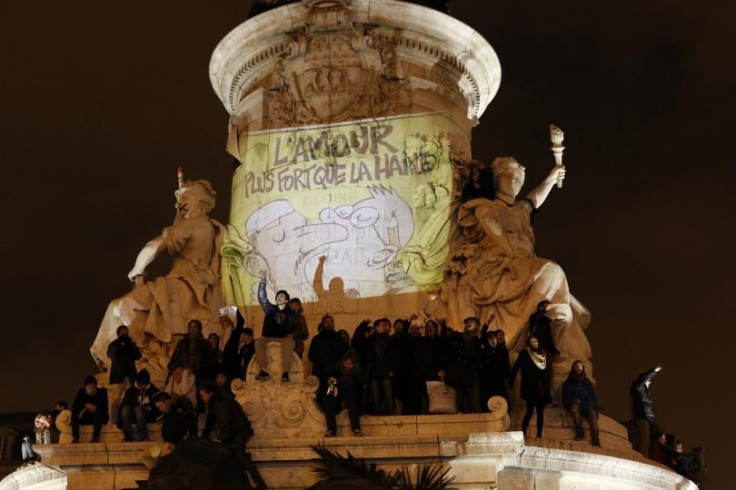Charlie Hebdo Sales Are Coming Back To Earth, One Year After The Deadly Attack On Its Paris Office

One year after gunmen in killed 12 people at the Paris offices of the French satirical weekly Charlie Hebdo, the magazine is still selling far more copies than it was before the killings. Although weekly sales have dwindled since the international attention around the violence in January 2015, the publication — both celebrated and criticized for its crude humor and irreverent cartoons — still appears to be seeing a residual boost, albeit a smaller one.
In the quiet winter of 2014, Charlie Hebdo’s sales were in a dark place, with a circulation of less than 30,000 copies, Financial Times reported. That all changed after the devastating attacks, which the gunmen claimed were revenge for a cover depicting the Muslim Prophet Muhammad. The issue after the attacks sold a staggering 8 million copies, an unprecedented level of demand that had the magazine printing issues around the clock to get enough copies out to the rest of Europe.
Sales in the immediate months that followed were boosted by new subscriptions and renewed interest in the publication, but they dwindled throughout the year until they reached an average of around 100,000 newsstand copies a week, FT reported in October. Le Monde reported this week that Hebdo has been selling on average 90,000 copies a week on the newsstand, on top of 180,000 subscribers, many of whom now come from outside of France.
The publication did not respond for comment when contacted about the sales figures.

Meanwhile, even with an anniversary issue dropping this week — for which the magazine printed a million copies — the surge in interest coming from America after the attacks appears to have subsided.
Two bookstores in New York City that ordered copies of the magazine in the weeks following the killings, Book Culture and the Albertine, said they stopped carrying Charlie Hebdo months ago.
“There's no demand for it; it’s an entirely French magazine,” said Chris Doeblin, owner of Book Culture. “It’s in the tradition of a French kind of satire. Nobody gets it over here.”
Doeblin said the reason his store stocked Charlie Hebdo last winter — as people across the world joined the rallying cry “Je Suis Charlie” ("I am Charlie") — was symbolic. “I think there was a reactionary call to libertarian freedom that people took, to shake their first at the intolerant voices. We stocked it for a couple of editions following that, and there was a special edition that the government helped to get out, but otherwise nothing.”
The Albertine, a bookstore funded by the French embassy on the edge of Central Park, has dropped it as well.
“We sold only a single, special issue of Charlie Hebdo after the attacks, since a lot a American and French clients had been asking for it,” said Emilie Cabouat, a press attaché at the embassy. “All profits were sent back to Charlie Hebdo.”
“Requests for Charlie Hebdo have been minimal since that period, except this week, when we had five requests,” she added.
But the embassy told International Business Times that it has no plans to carry Charlie Hebdo’s anniversary issue this week.
The cover of the new issue features an illustration of God, packing a Kalashnikov rifle, under the headline “One year on: The killer is still at large.”
© Copyright IBTimes 2024. All rights reserved.






















